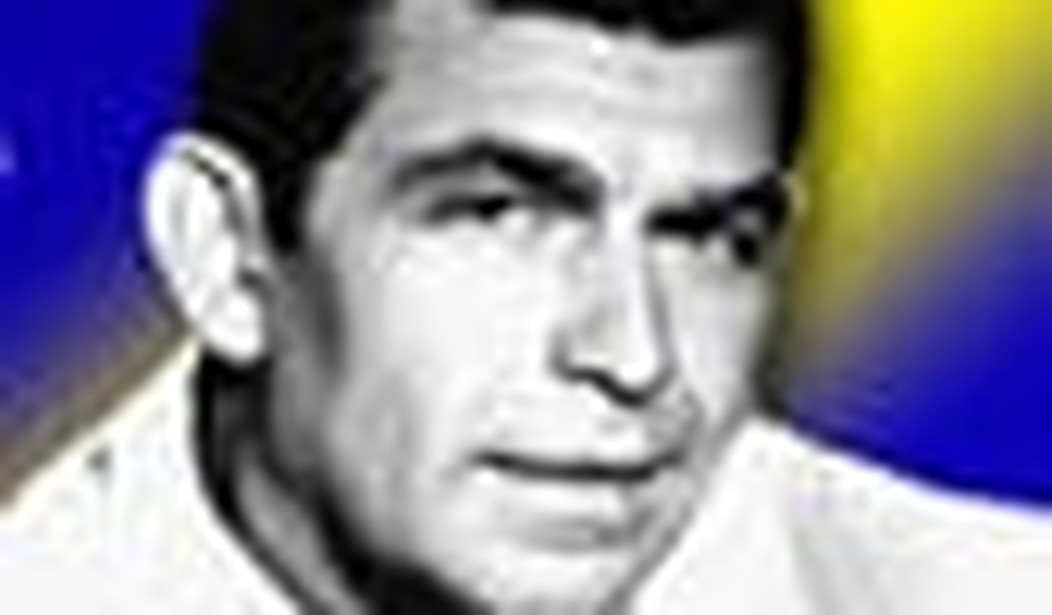The actor and comedian Andy Griffith died today at the age of 86. He was described in the USA Today report as “beloved,” and his relationship with the public did indeed fit that description.
Griffith was best known, of course, for his character of Sheriff Andy Taylor in The Andy Griffith Show, which ran from 1960 to 1968. Sheriff Taylor, a widower with a young son, Opie (Ronny Howard), stood for staunchly conservative values such as law and order, self-discipline and self-reliance, good manners, private charitable action, good government, love for family and loyalty to community, and a simple Christian faith. In his personal life, Griffith was a strong partisan of the Democrat Party and contributed a good deal of money to it.
Griffith also starred as a cranky Southern criminal-defense lawyer in Matlock, from 1986 to 1995. The character’s prickly attitude and parsimony brought the actor’s trademark homespun humor to the mystery-drama series, and the sharp-witted lawyer conveyed the same appeal to bourgeois values as Sheriff Taylor, in a very different way.
In the 1950s, Griffith reached his first fame as a stand-up comedian, typically taking on the character of a rural southerner mystified by the ways of the modern world. His most acclaimed routine was “What It Was, Was Football,” in a which a naive individual tries to describe a football game. It’s quite possibly a classic of American humor. Griffith also showcased his musical abilities on his comedy albums, in film roles, and in music albums, and later on his television shows.
In his comedy recordings, Griffith showed a significant influence of 19th-century Southern humorists, especially in the use of long narratives and pointedly naive characters. His work also, however, included elements of the more Northern and Midwestern tradition of the cracker-barrel philosopher. This may have helped strengthen his national appeal.
Griffith’s success as a comedian brought him some prominent movie roles in the second half of the 1950s, most notably the cynical character “Lonesome” Rhodes in the classic drama A Face in the Crowd (1957), directed by Elia Kazan from a screenplay by Budd Schulberg. This was Griffith’s first feature film role, and he gives an impressive performance as a seemingly naive but in fact greedy and manipulative vagabond who becomes a popular television host and has his eye on amassing political power.
The role made him a star, and Griffith’s performance shows what a talented and versatile actor he was. His performance in the film No Time for Sergeants a year later firmly established his abilities as a comic actor.
Perhaps the most interesting aspect of Griffith’s career was his refusal to simplify his characters and pander to audiences. Like Ben Matlock, Sheriff Andy Taylor is not conventionally winsome. He is strong, intelligent, of essentially sterling character—yet really not very personable. His character is certainly not a comical one. Rather dour, beetle-browed, and often openly frustrated at others’ incompetence, Taylor is quite formidable and even a bit frightening. Sheriff Taylor functions as the voice of reason in a community of ridiculous characters. As such, one can see evident appeal in his character as a rock of stability and common sense in the rapidly changing American society of the 1960s.
Griffith accomplished a similar feat with his characterization of Ben Matlock. Instead of portraying the sexagenarian as a kooky old person pursuing asinine whims, or as an embittered former striver disappointed with the way his life has turned out, Griffith gives Matlock a good deal of nuance. He plays the character as strong-willed, smart, self-directed, and self-confident but beset by difficulties in a world that has in many ways cast aside his bourgeois values. Matlock is not shown as aging quite gracefully, but instead as a good man stubbornly retaining his values in a world that has cast them aside. He will not be cast aside himself.
This insistence on creating real characters in all their sometimes-unappealing complexity is central to Andy Griffith’s accomplishments as an actor and comedian. The values his work conveyed, and the critical eye they cast on the America of his time, make him a truly important figure in the nation’s entertainment history and in the American culture.









Join the conversation as a VIP Member